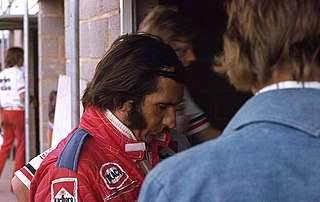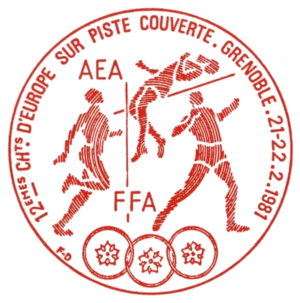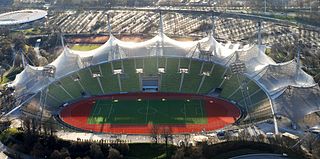Ian Stewart MBE is a Scottish former long-distance running athlete. Ian Stewart was one of the world's leading distance runners between the late 1960s and mid-1970s. Stewart won the bronze medal in the Men's 5000 metres at the 1972 Summer Olympics in Munich. Stewart also won the following championships: European 5,000 metres (1969), Commonwealth 5,000 metres (1970), European Indoor and World Cross Country (1975).

Lasse Artturi Virén is a Finnish former long-distance runner, winner of four gold medals at the 1972 and 1976 Summer Olympics. Virén recaptured the image of the "Flying Finns" promoted by runners like Hannes Kolehmainen, Paavo Nurmi and Ville Ritola in the 1920s. He was elected Finnish Sportsman of the Year in 1972 and 1976 and later became a politician and a member of Finland's parliament in 1999–2007 and 2010–2011.

Mohammed Tlili ben Abdallah, also known as Moham(m)ed Gammoudi, is a Tunisian athlete who competed as a long-distance runner in international track and field competitions. He represented Tunisia in the Tokyo, Mexico City, and Munich Olympiads and recorded four medals, including a gold medal in the 5000 metres event in Mexico City. Gammoudi was also competitive at 10,000 metres.

The 1972 French Grand Prix was a Formula One motor race held at the Circuit de Charade in Clermont-Ferrand, Auvergne, France on 2 July 1972. It was race 6 of 12 in both the 1972 World Championship of Drivers and the 1972 International Cup for Formula One Manufacturers.

The 1972 Formula One season was the 26th season of the FIA's Formula One motor racing. It featured the 23rd World Championship of Drivers, the 15th International Cup for F1 Manufacturers, and numerous non-championship Formula One races. The World Championship commenced on 23 January and ended on 8 October after twelve races.

The 1500 metres or 1,500-metre run is the foremost middle distance track event in athletics. The distance has been contested at the Summer Olympics since 1896 and the World Championships in Athletics since 1983. It is equivalent to 1.5 kilometers or approximately 15⁄16 miles. The event is closely associated with its slightly longer cousin, the mile race, from which it derives its nickname "the metric mile".

Thomas Wessinghage is a German former middle- and long-distance runner who won the 1982 European Championships' final over 5000 metres beating the British world-record holder David Moorcroft. Because he was already thirty at the time, and had been an international-level runner for a decade, this victory was a long-awaited one for him. He admitted that he decided to run the 5,000 metres instead of the 1,500 metres, because he lost to Ovett and Coe so often in the shorter distance. The fairly slow pace of the 1982 European Athletics Championships 5,000-metre final favoured Wessinghage, because he was in top form - having set a European record at 2,000 metres shortly before the Championships - and because he was the fastest 1,500-metre runner in the final, having run that distance in 3 minutes 31.6 seconds in 1980. Shortly after he started his final sprint with over 250 metres to go, Wessinghage moved into a decisive lead, stretching it into five metres by 4,800 metres and almost doubling it by 4,900 metres.

The 5000 metres or 5000-metre run is a common long-distance running event in track and field, approximately equivalent to 3 miles 188 yards or 16,404 feet 2 inches. It is one of the track events in the Olympic Games and the World Championships in Athletics, run over 12+1⁄2 laps of a standard 400 m track, or 25 laps on an indoor 200 m track. The same distance in road running is called a 5K run; referring to the distance in metres rather than kilometres serves to disambiguate the two events. The 5000 m has been present on the Olympic programme since 1912 for men and since 1996 for women. Prior to 1996, women had competed in an Olympic 3000 metres race since 1984. The 5000 m has been held at each of the World Championships in Athletics in men's competition and since 1995 in women's.

The 1981 European Athletics Indoor Championships were held in Grenoble, a city in France, between 21–22 February 1981. It was the second time the championships were held in the city. The track used for the championships was 180 metres long.

The men's marathon at the 1972 Summer Olympics in Munich, West Germany was held on Sunday September 10, 1972. The race started at 15:00h local time. There were 74 competitors from 39 countries. Twelve of them did not finish. The maximum number of athletes per nation had been set at 3 since the 1930 Olympic Congress. The event was won by Frank Shorter of the United States, the nation's first Olympic marathon victory since 1908 and third overall. Karel Lismont won Belgium's second medal in the marathon with his silver. Mamo Wolde of Ethiopia became only the second man, after his countryman Abebe Bikila, to win two medals in the marathon. Ethiopia's four-Games medal streak was matched only by Finland (1920–1932).
The official results of the Men's 10,000 metres at the 1976 Summer Olympics in Montreal, Quebec, Canada. The final was held on Monday July 26, 1976, after the qualifying heats were run on Friday July 23, 1976.

The 2009 European Cross Country Championships was a continental cross country running competition that was held on 13 December 2009 near Dublin city, Fingal in Ireland. Dublin was selected as the host city in 2007 and the event was the first time that a major European athletics championships took place in Ireland. The six men's and women's races in the championship programme took place in Santry Demense on a looped course with flat and grassy ground. The 16th edition of the European Cross Country Championships featured 323 athletes from 30 nations.

The 2013 European Cross Country Championships was the 20th edition of the cross country running competition for European athletes which was held in Belgrade, Serbia, on 8 December 2013. The senior individual winners were Alemayehu Bezabeh of Spain and Sophie Duarte of France. A record 571 runners from 37 nations entered the competition, making it Serbia's largest international athletics event in over forty years.
The men's 5000 metres at the 1971 European Athletics Championships was held in Helsinki, Finland, at Helsinki Olympic Stadium on 12 and 14 August 1971.
Michèle Beugnet is a former French athlete, specialising in the sprints.
. Claudine Meire is a former French athlete, who specialised in the sprints.
Nicole Pani is a former French athlete, who specialised in sprinting.
Sylviane Telliez is a former French track and field who competed in short sprints. She dominated French sprinting in the first half of the 1970s. She was a four-time medallist in the 60 metres at the European Athletics Indoor Championships from 1970 to 1974. She was also a 100 m finalist at the 1969 European Athletics Championships.
The women's 4 × 180 metres relay event at the 1972 European Athletics Indoor Championships was held on 11 March in Grenoble. Each athlete ran one lap of the 180 metres track.
The women's 4 × 360 metres relay event at the 1972 European Athletics Indoor Championships was held on 12 March in Grenoble. Each athlete ran two laps of the 180 metres track.










